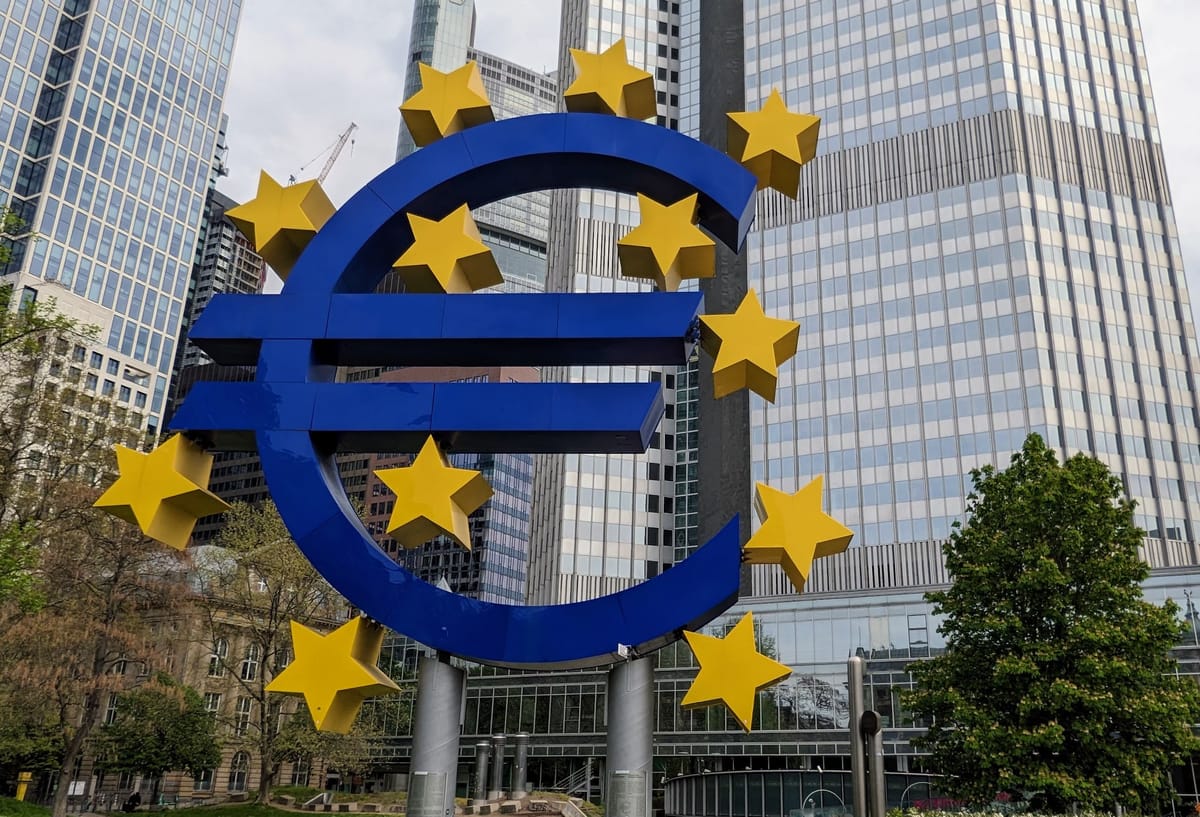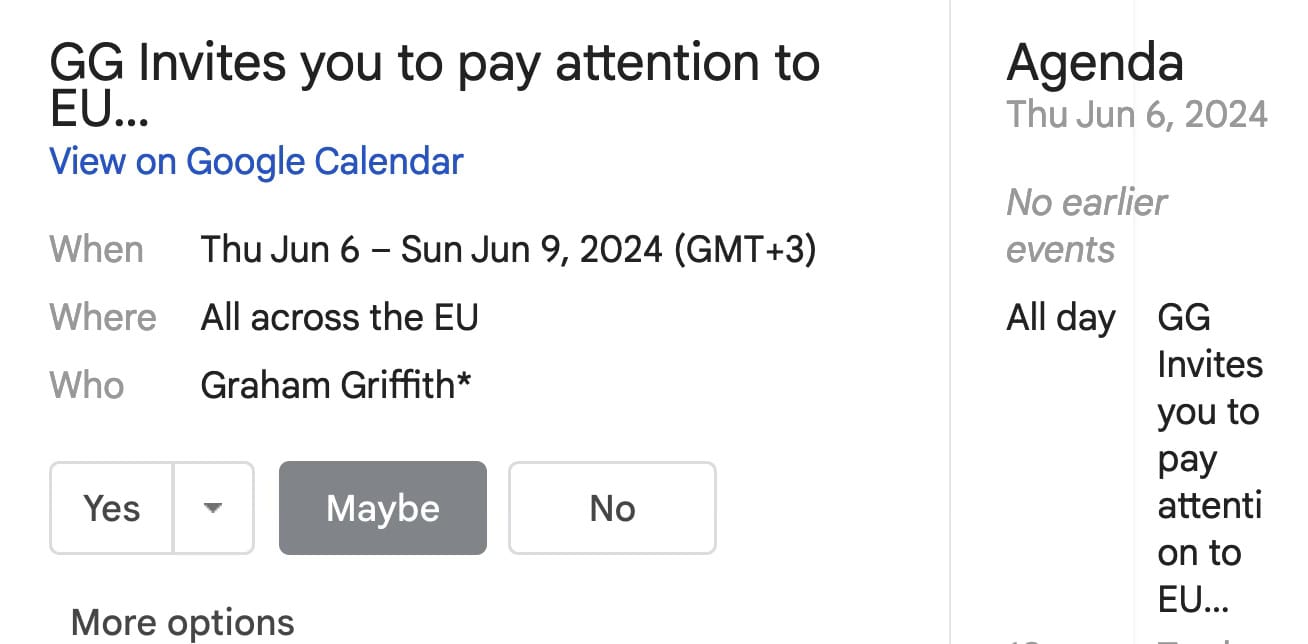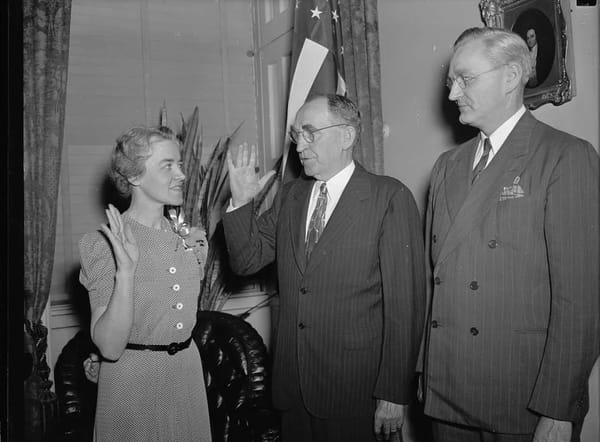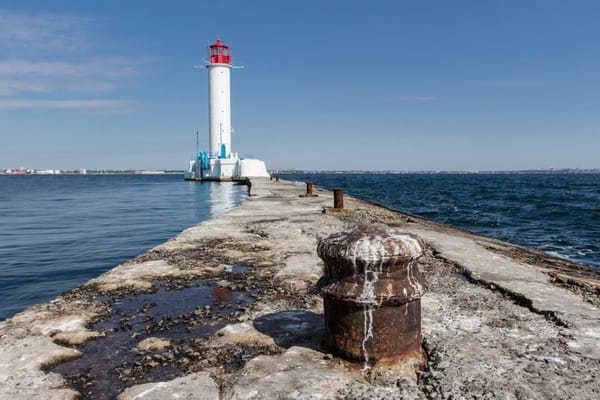Show US what democracy looks like, EU voters
Tuning in to the June elections for the European Parliament

Last week the Center for the Study of Democracy hosted an online discussion about this year’s US elections with reporters and editors from the Wall Street Journal. John Bussey moderated the conversation, which was directed at Europeans rather than US voters (You can watch the event here). The conversation was organized in part because this US election is a global election, as much as any past election has been. Friends, colleagues, students, and journalists here frequently ask me about the US elections, and the presidential race in particular. And they often note, more with stress than curiosity, that while they can’t vote in the election, the outcome will affect them greatly.
As most of you have read or heard again and again, 2024 is a year of elections the likes of which the world has never seen before. By most estimates, nearly 50% of people around the world will have an opportunity to vote this year. Yes, some of these elections are, let’s say, less than legitimate. Yet an historic number of people will be participating in the act of casting votes. The US elections, whether we like it or not, are the most consequential for people around the globe.
Notes from New Europe is a reader-supported publication. To receive new posts and support my work, consider becoming a free or paid subscriber.
AND other elections will have global consequences of varying degrees. Yes, even for Americans. Perhaps colored by my work over the last year, it seems clear to me that the European Parliament elections are the second most important. So I’m encouraging people outside the EU to pay attention.

Just as change begins in the home, learning begins in the brain—your own brain. So after the Wall Street Journal event, I spent the last week annoying reaching out to several contacts in the eastern part of Europe to get their thoughts on the European Parliament elections.
TLDR: A common theme has been that most people here are not spending much time thinking about it, and there is a lot at stake for individual countries, the future of the EU, and especially the future for Ukrainians and by extension the future for citizens in countries vulnerable to Kremlin influence.
Boyko Vasilev is one of the most important broadcast journalists in Bulgaria. He hosts the weekly news and politics show Panorama. In a fractured media environment, politicians and experts across the political spectrum continue to see Panorama as a program they should watch and join (when asked). Americans of a certain age might think of him as Bulgaria’s Uncle Walter. So Boyko is an important barometer (and I hope to share more from conversations with him in future pieces). When I asked him if the EU elections are the is the second most import, he paused….and then said “yes, I think we can say it is the second most important of the real elections.”
He argues that the elections are important to watch to understand for a larger EU strategy on enlargement (Ukraine, etc) and Kremlin hostility (Ukraine, etc). I shared a frustration I felt when seeing one of the US’s major news organization refer to the European Parliament elections as “an important gauge” on politics throughout Europe—ignoring the importance of the European Parliament as a legislative body that sets policy. While he seemed to agree that this was incomplete, he noted that we should also watch the voting trends across the EU as a gauge, or indicator, of political and broader shifts at national and continent wide levels. So he will be tracking the anticipated growing support for nationalist parties like AFD in Germany, Vazrazhdane in Bulgaria, and the Finns Party (do you need me to say where that party is?) and what may be a decline for the European Greens. And he is eager to see what happens with so-called traditional “centrist” parties.
Bobby Phillips teaches political science at The American University of Bulgaria. An American who has lived in Bulgaria for 30 years, Bobby has been a helpful guide for me here. He sees the EU elections as important to the US largely because the EU Parliament’s decisions “reverberate” around the world, and the EU is arguably the US’s most important strategic partner. I asked Bobby why we don’t pay closer much attention:
Phillips: Many US pundits, political actors, and journalist can’t really wrap their heads around the European Parliament (EP). It just seems like strange animal—a democratically elected transnational parliament whose members often need translators to understand each other. These Americans, therefore, typically frame European Union (EU) policy making solely as negotiations between governments or between government leaders instead of the EU level process that produces most of the EU’s policies.
But this democratically elected transnational parliament strange animal actually matters. The daily lives of Europeans have been directly affected by decisions either created or fundamentally shaped in the European Parliament—from online privacy rights to lower or no roaming charges to compensation for late airplanes.
As for what we should pay attention to in these elections, Bobby points to turnout:
Phillips: While some pundits will try to read US political fortunes in the tea leaves of these EP elections, we have to remember that EP elections are usually lower-turnout elections fought on national (not European) issues. So, we should watch for turnout (since higher turnout will likely favor more mainstream parties) as well as the direction of the vote. Many pundits have predicted that we will see an increase in the right and far right in these elections and that this will create a lurch to the right on many issues. But this will be more complicated than it appears—even if it does happen. Other than anti-migration views and a dislike for yielding further sovereignty to EU institutions, many parties of the right/far right hold positions that conflict with their fellow parties. They can’t even agree to sit together and have to sit in two political groups (caucuses) in the EP.

Turnout is the most common theme among the people I’ve been speaking with. For as much as I am hoping those of us outside of Europe will pay closer attention, getting Europeans to pay attention has also been a challenge. Maciej Makulski, contributing editor and author for New Eastern Europe provided some context from Warsaw:
As a person who remembers May 1 2004 when the enlargement happened I have to admit I have never observed a large involvement of Polish society during the EU election (it is arguably a common thing for the entire Central and Eastern Europe). I am not talking here only about the election turnout but the level of emotions is significantly lower. Citizens feel disconnected from EU politics and do not see a direct link between EU politics and their everyday lives as many are not aware that the majority of legislation approved in Poland is EU-created, not national.
Still Maciej sees this year’s election as critical on many of the issues we’ve discussed, with some important added importance in Poland:
At this point, the political actors have not started yet to frame their strategies for the EU election campaign. On the one hand, the security issues (Russia and the war) are a bipartisan issue and there is a broad consensus about supporting Ukraine and containing Russia. On the other hand, the problematic issue has been the Ukraine grain issue and its import to the EU which affected Polish farmers significantly. The government has already started to neutralize this issue but it will be used by right/populist/ conservative parties and it can be connected with the European Green Deal issue. It will arguably be the topic that will be used the most in selling anti-EU discourse during the election and the ruling coalition will not be able to ignore it.
While I can’t make space for every country on the eastern edge of the EU, I do want to close with thoughts from a Finnish journalist, Pauliina Grym. Pauliina is a radio and podcast host for YLE, Finland’s national broadcaster. She too is watching for any rise in support of right-wing parties and Finnish voters’ willingness to support Ukraine. She also reminds us of all the very tangible changes that have taken place for Finland in the last two years, including the historically neutral country joining NATO. She is also watching how voters are considering Russia's threats to Finland’s Baltic neighbors. And even closer to home,
We are looking at our border with Russia. How many asylum seekers will we have there this spring? The winter made the logistics harder. Our eastern border is still closed, and to be honest I don't know what else we could do.
These are just a few examples of what is at stake for people in these EU countries. The issues aren’t really so foreign, though I can say now from experience that the conversations on these themes, with the people living with them, worrying about them, and trying to steer away from the darkness, are highly compelling. I’ll end with a suggestion, especially for readers on the other side of the Atlantic.
I invite you to have one less conversation each day shrouded in worry about the US election, and use that oxygen to seek out stories about the second most globally consequential election of 2024, coming this June
Thank you for reading Notes from New Europe. This post is public so feel free to share it.




